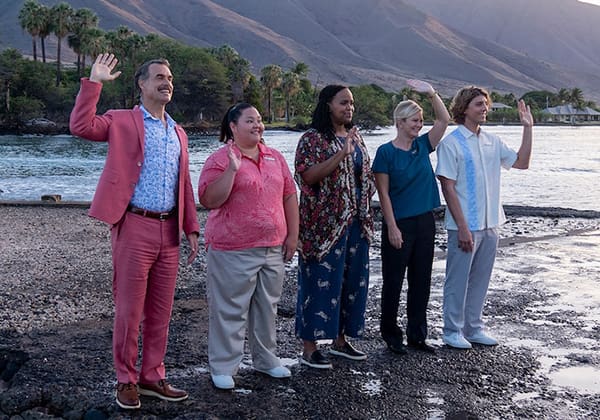HBO’s The White Lotus opens on a bothered Shane Patton (Jake Lacy) fidgeting with his wedding ring. Seemingly all by his lonesome in a departure lounge, he is seen staring onto the tarmac where a box labelled “human remains” is boarded onto his plane. Sound familiar? With its yellow-tint, The White Lotus makes for a deceiving interpretation of Hawaii, with a murder mystery at its heart. While set in the affluence of its main characters – the Sam White creation makes for a social satire of inequality and privilege à la Big Little Lies.
The episode then flashes back a week prior, to a ferrying boat towards the titular luxury resort. Onboard with Shane is his newlywed “trophy wife,” Rachel (Alexandra Daddario), and several other guests. Disembarking, the guests are greeted by Armond (Murray Bartlett), the spiralling resort manager, and Belinda (Natasha Rothwell), the spa and wellness consultant, and quickly debriefs “We are asked to disappear behind our masks, as pleasant interchangeable helpers. It’s tropical kabuki!”
Throughout the miniseries, White produces a study on character and relationship development between the affluent guests and downtrodden staff, set under the guise of power imbalances and privilege – a customer-service nightmare. Shane makes for the resident ‘Karen,’ or Ken if you will, in a constant stand-off with Armond where he feels he’s being cheated out of the elite Pineapple suite that his coddling mother, Kitty (Molly Shannon), gifted him for his honeymoon. Although a constant turning tables of power, White explores contemporary notions of male white privilege in Shane’s unrelenting pursuits to satisfy his “customer is always right” mentality, despite causing Armond’s spiral back into substance abuse which would lead to his ultimate demise – it is a grim reminder to always be kind to customer-service reps.
The most heartbreaking relationship development to watch is that of Belinda and Tanya (the incomparable Jennifer Coolidge), a grieving and spaced-out alcoholic, exploring the manipulative power play of money in the relationship. As well as being the spa and wellness consultant for Tanya, who continuously compliments Belinda’s “healing ability” (playing on the “magical negro” trope), Belinda acts above her station and makes for a confidante and seemingly lady-in-waiting for Tanya, tucking her in after dinner when she’s blacked out. Tanya continually promises the possibility of investing in Belinda opening her own wellness business but putting off reading her proposal – leaving Belinda hanging on by a thread.
The accumulating injustices Belinda takes in stride every episode is heartbreaking to watch, and White explores the manipulative power of dangling money and promises of a better life from a rich white woman to a working-class black woman. Tanya leaves Belinda high and dry at the end with only an envelope of cash. She is in a better state than the one she came in, with Belinda being much worse-for-wear. The ending invalidated Belinda’s efforts and experience and reduced their relationship to a mere monetary exchange rather than the authentic connection it was thought to have been.
Sitting poolside, Olivia (Sydney Sweeney) and Paula (Brittany O’Grady) are leisurely reading Frantz Fanon’s The Wretched of the Earth and Camille Paglia’s Sexual Personae, noticeably high-brow intellectual tomes and not the typical vacation reads. Shane swims over and questions, “yesterday you were reading Freud and Nee-chi [Nietzsche, which is quite telling of his character] … are you actually reading any of these books?” to which the resident mean girls languidly retort, “No, they’re just props.” “We have a stylist choose our outfits, and we have a book stylist to pick out our books.” The very notion of a book stylist is a priceless commentary on Gen Z intellectual culture and the work of ‘image architects,’ but it also lends itself to a reflection of the performative activism of the generation.
Olivia and the Mossbachers are a white, upper-middle-class family, and Paula is the only guest of colour. White explores discourses on colonialism in that Olivia’s intellectualising of systemic racism and social injustices doesn’t necessarily mean understanding the lived experiences of Paula and her holiday fling with Kai, a native-Hawaiian employee at the resort – which is situated on the unceded land of his ancestry. “Obviously, colonialism was bad,” Mark, the existential hypochondriac and Mossbacher patriarch, tells Paula and the family over dinner whilst she sits unsettled by Kai having to perform a traditional dance for the guests. “But it’s humanity. Welcome to history. Welcome to America.” The tone-deaf conversations Paula has to listen to whilst also having to appear grateful on her self-acknowledged vacation hand-out highlights the blurry difference between activism and the weaponisation of it for the sake of appearing “woke” – making for a fly-on-the-wall on the powers and privileges at play.
In the end, the “lotos-eaters” leave the resort in a more rejuvenated state than when arriving and return to their lives, with the consequences of their actions being a mere slap on the wrist, and left for the staff to clean up. While exploring a class satire on privilege and power dynamics, White produces a grim reflection of society that sounds all too familiar. The ending is uneventful and offers no revolutionary way to “fight the system.” But that’s the point, painting a world that can only be observed – irrevocable in its ways.





